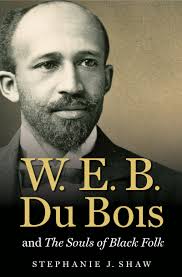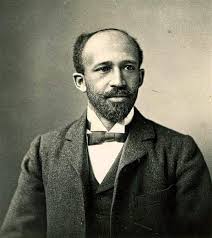The Souls of Black Folk Page #35
The Souls of Black Folk is a 1903 work of American literature by W. E. B. Du Bois. It is a seminal work in the history of sociology and a cornerstone of African-American literature. The book contains several essays on race, some of which the magazine Atlantic Monthly had previously published.
Above the croppers come the great mass of the black population who work the land on their own responsibility, paying rent in cotton and supported by the crop-mortgage system. After the war this system was attractive to the freedmen on account of its larger freedom and its possibility for making a surplus. But with the carrying out of the crop-lien system, the deterioration of the land, and the slavery of debt, the position of the metayers has sunk to a dead level of practically unrewarded toil. Formerly all tenants had some capital, and often considerable; but absentee landlordism, rising rack-rent, and failing cotton have stripped them well-nigh of all, and probably not over half of them to-day own their mules. The change from cropper to tenant was accomplished by fixing the rent. If, now, the rent fixed was reasonable, this was an incentive to the tenant to strive. On the other hand, if the rent was too high, or if the land deteriorated, the result was to discourage and check the efforts of the black peasantry. There is no doubt that the latter case is true; that in Dougherty County every economic advantage of the price of cotton in market and of the strivings of the tenant has been taken advantage of by the landlords and merchants, and swallowed up in rent and interest. If cotton rose in price, the rent rose even higher; if cotton fell, the rent remained or followed reluctantly. If the tenant worked hard and raised a large crop, his rent was raised the next year; if that year the crop failed, his corn was confiscated and his mule sold for debt. There were, of course, exceptions to this,—cases of personal kindness and forbearance; but in the vast majority of cases the rule was to extract the uttermost farthing from the mass of the black farm laborers. The average metayer pays from twenty to thirty per cent of his crop in rent. The result of such rack-rent can only be evil,—abuse and neglect of the soil, deterioration in the character of the laborers, and a widespread sense of injustice. “Wherever the country is poor,” cried Arthur Young, “it is in the hands of metayers,” and “their condition is more wretched than that of day-laborers.” He was talking of Italy a century ago; but he might have been talking of Dougherty County to-day. And especially is that true to-day which he declares was true in France before the Revolution: “The metayers are considered as little better than menial servants, removable at pleasure, and obliged to conform in all things to the will of the landlords.” On this low plane half the black population of Dougherty County—perhaps more than half the black millions of this land—are to-day struggling. A degree above these we may place those laborers who receive money wages for their work. Some receive a house with perhaps a garden-spot; then supplies of food and clothing are advanced, and certain fixed wages are given at the end of the year, varying from thirty to sixty dollars, out of which the supplies must be paid for, with interest. About eighteen per cent of the population belong to this class of semi-metayers, while twenty-two per cent are laborers paid by the month or year, and are either “furnished” by their own savings or perhaps more usually by some merchant who takes his chances of payment. Such laborers receive from thirty-five to fifty cents a day during the working season. They are usually young unmarried persons, some being women; and when they marry they sink to the class of metayers, or, more seldom, become renters. The renters for fixed money rentals are the first of the emerging classes, and form five per cent of the families. The sole advantage of this small class is their freedom to choose their crops, and the increased responsibility which comes through having money transactions. While some of the renters differ little in condition from the metayers, yet on the whole they are more intelligent and responsible persons, and are the ones who eventually become land-owners. Their better character and greater shrewdness enable them to gain, perhaps to demand, better terms in rents; rented farms, varying from forty to a hundred acres, bear an average rental of about fifty-four dollars a year. The men who conduct such farms do not long remain renters; either they sink to metayers, or with a successful series of harvests rise to be land-owners. In 1870 the tax-books of Dougherty report no Negroes as landholders. If there were any such at that time,—and there may have been a few,—their land was probably held in the name of some white patron,—a method not uncommon during slavery. In 1875 ownership of land had begun with seven hundred and fifty acres; ten years later this had increased to over sixty-five hundred acres, to nine thousand acres in 1890 and ten thousand in 1900. The total assessed property has in this same period risen from eighty thousand dollars in 1875 to two hundred and forty thousand dollars in 1900. Two circumstances complicate this development and make it in some respects difficult to be sure of the real tendencies; they are the panic of 1893, and the low price of cotton in 1898. Besides this, the system of assessing property in the country districts of Georgia is somewhat antiquated and of uncertain statistical value; there are no assessors, and each man makes a sworn return to a tax-receiver. Thus public opinion plays a large part, and the returns vary strangely from year to year. Certainly these figures show the small amount of accumulated capital among the Negroes, and the consequent large dependence of their property on temporary prosperity. They have little to tide over a few years of economic depression, and are at the mercy of the cotton-market far more than the whites. And thus the land-owners, despite their marvellous efforts, are really a transient class, continually being depleted by those who fall back into the class of renters or metayers, and augmented by newcomers from the masses. Of one hundred land-owners in 1898, half had bought their land since 1893, a fourth between 1890 and 1893, a fifth between 1884 and 1890, and the rest between 1870 and 1884. In all, one hundred and eighty-five Negroes have owned land in this county since 1875.
Translation
Translate and read this book in other languages:
Select another language:
- - Select -
- 简体中文 (Chinese - Simplified)
- 繁體中文 (Chinese - Traditional)
- Español (Spanish)
- Esperanto (Esperanto)
- 日本語 (Japanese)
- Português (Portuguese)
- Deutsch (German)
- العربية (Arabic)
- Français (French)
- Русский (Russian)
- ಕನ್ನಡ (Kannada)
- 한국어 (Korean)
- עברית (Hebrew)
- Gaeilge (Irish)
- Українська (Ukrainian)
- اردو (Urdu)
- Magyar (Hungarian)
- मानक हिन्दी (Hindi)
- Indonesia (Indonesian)
- Italiano (Italian)
- தமிழ் (Tamil)
- Türkçe (Turkish)
- తెలుగు (Telugu)
- ภาษาไทย (Thai)
- Tiếng Việt (Vietnamese)
- Čeština (Czech)
- Polski (Polish)
- Bahasa Indonesia (Indonesian)
- Românește (Romanian)
- Nederlands (Dutch)
- Ελληνικά (Greek)
- Latinum (Latin)
- Svenska (Swedish)
- Dansk (Danish)
- Suomi (Finnish)
- فارسی (Persian)
- ייִדיש (Yiddish)
- հայերեն (Armenian)
- Norsk (Norwegian)
- English (English)
Citation
Use the citation below to add this book to your bibliography:
Style:MLAChicagoAPA
"The Souls of Black Folk Books." Literature.com. STANDS4 LLC, 2025. Web. 11 Jan. 2025. <https://www.literature.com/book/the_souls_of_black_folk_310>.




Discuss this The Souls of Black Folk book with the community:
Report Comment
We're doing our best to make sure our content is useful, accurate and safe.
If by any chance you spot an inappropriate comment while navigating through our website please use this form to let us know, and we'll take care of it shortly.
Attachment
You need to be logged in to favorite.
Log In